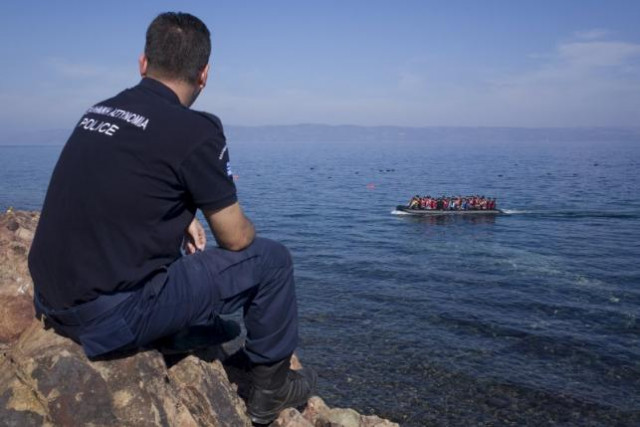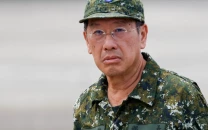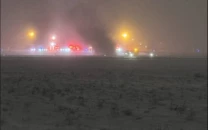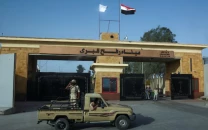After Paris attacks, Greek migrant tests remain cursory
After two militants involved in the Paris attacks came through a Greek island, Athens faces scrutiny over screening

A Greek police officer looks at an overcrowded dinghy carrying refugees and migrants arriving on the Greek island of Lesbos. PHOTO: REUTERS
After revelations that two militants involved in the Paris terror attacks slipped into Europe through another Greek island, posing as refugees, Athens has faced heavy scrutiny over its screening of more than 750,000 people who have landed on its shores this year.
Eleven migrants, including six children, drown off Greece: coastguard
This week Yiannis Mouzalas, the minister in charge of migration, admitted "delays and failings" in Greece's handling of the influx and called on the European Union to activate a crisis mechanism that will allow it to claim emergency aid.
Athens has faced growing criticism on border security from other European countries including Hungary and Slovakia, and has been forced to refute a report that its place in Europe's passport-free Schengen zone is in jeopardy.
On Lesbos, the main European gateway for refugees and other migrants from the Middle East and elsewhere, officials systematically register and test arrivals to judge whether they are really from where they say they are -- but the process is quick and not especially detailed.
"The first day, the coastguard asks your name, your nationality and your age," said Hamidullah, an Afghan.
"The following day, you register at Moria (a refugee camp). The police take your fingerprints, photographs and ask some questions. This took no longer than five minutes."
Hamidullah has no passport, merely a piece of paper stating his identity. Many others turn up with no papers at all.
At the Moria camp, one of five "hotspots" set up on Greek Aegean islands to register migrants, one police officer said the lack of identity documents was a major obstacle to testing the veracity of people's claims.
Greek coastguard says newborn migrant boy found dead
"In many cases, the refugees say they lost their passport en route," said the officer, speaking on condition of anonymity. "The only way to verify their nationality is by interviewing them with the help of interpreters."
An Afghan interviewer working at Moria, however, insisted the five-minute "nationality test" is effective.
"The accent can't fool you," he said.
"Precise questions are asked, like the name of politicians, or food delicacies of certain regions of the countries they declare as their countries of origin."
Officials struggling to cope with the situation on the ground on Lesbos are frustrated by the criticism being levied at Greece from abroad after the Paris attacks.
"They blamed us for not managing to track down the two terrorists among the 776,000 people that have passed through Greece from the beginning of the year," said one police lieutenant, speaking on condition of anonymity.
"How is it possible to track down a terrorist in the making, if he isn't being tracked by Interpol, if other European countries don't share their information, and if he's using a passport that is real but stolen?"
Another policeman said, however, that "the tests have been more strict" since the Paris attacks, admitting: "Until the end of the summer, the order was to let the refugees pass through as quickly as possible."
Greece has accepted the deployment of extra border guards from EU border agency Frontex, while it is seeking aid from the EU including 100,000 first aid kits, raincoats and sleeping bags, 1,500 tents and 100 portable toilets.
For the mayor of Lesbos's main town Mytilene, Spyros Galinos, the migrant crisis is a Europe-wide problem and the EU as a whole has a responsibility to improve the situation.
Holder of Syrian passport found near Paris gunman crossed Greece
"Greece is a country in crisis," he said, pointing to "budget cuts, shortages of policemen and coastguards".
"I have written several times to the European commissioners in order to ask for financial and logistical aid, and now they accuse us of not asking for help in time," he added.
Migration minister Mouzalas has said Greece's request for emergency migrant aid was not made sooner because the government's exact requirements had not been assessed.
But he, too, has said the EU is not blameless in the situation, saying the bloc failed to respond to a previous Greek request for an additional 1,600 police officers.



















COMMENTS
Comments are moderated and generally will be posted if they are on-topic and not abusive.
For more information, please see our Comments FAQ